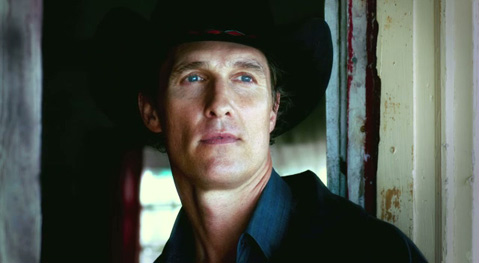Killer Joe
Matthew McConaughy, Emile Hirsch, and Gina Gershon star in a film written by Tracy Letts, based on his stage play, and directed by William Friedkin.

Dastardly deeds and fearsome amorality lurk around most of the corners in the creepily gripping film Killer Joe, and yet the nasty factors are strangely counter-balanced by an odd, lazy-paced elegance. That slow-burning, deceptive gracefulness, with brutality on the side and in the wings, is just one of the aspects connecting the film to the hip, funny, noir-ish world of the Brothers Coen, especially No Country for Old Men and Fargo, whose murder-for-hire-run-amok angle adds up to a relatively new filmic family tree.
Powerful in its creepy but engaging way, and shameless good dark fun, Killer Joe marks a bold return to directorial form for William Friedkin, who hasn’t had much going for his once-strong filmography in years. The film also signifies the career high for actor Matthew McConaughey. In many of his roles, McConaughey seemed to be gliding by on his handsome mug and Texan drawl, and we wondered if he shouldn’t just pursue another line of work. But here he brings an unexpectedly sinister cool, a misdirected and manipulative sexuality, and measured, balletic violence to his title role.
In screenwriter Tracy Letts’s incisive adaptation of his stage play, Joe is a killer, a Dallas cop who offs folks in his off hours. He also kills with cunning, and wriggles his way into the disfavor and lives of a troubled, insurance-money-hungry family of Texans, in which the only relatively innocent figure is the young woman Dottie (Juno Temple). She is rendered into something of a sacrificial lamb, but she also gets the last laugh/word/retribution squeeze play. Scenes of sadism, including a soon-to-be-classic dinner scene gone perversely gonzo, with KFC, cans of Busch, and a peach can repurposed as a weapon, are easier to view from a distance when virtually every character is a rotten apple.
While there are bursts of ultraviolence — which presumably helped earn the film its headline-grabbing NC-17 rating — the film also circles around the kill zone, relishing its sense of impending doom with a patient visual poetry (courtesy of cinematographer Caleb Deschanel) and the feel of a deft Southern Gothic narrative playground in the offing. Friedkin can add Killer Joe to his handful of memorably classic films, alongside The Exorcist, The French Connection, and Cruising, each skillfully dealing with genre play and approaching cinematic artistry, in different shades of dark.



